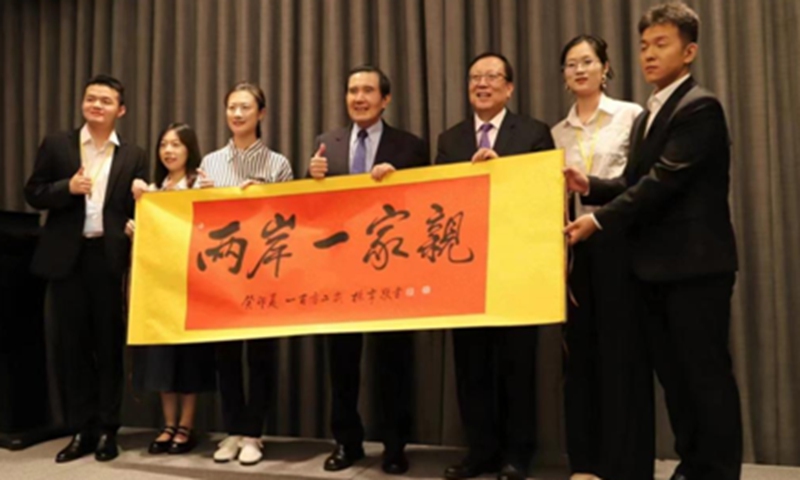
Ma Ying-jeou (center), former chairperson of the Chinese Kuomintang Party, holds a banner to welcome the visiting Chinese mainland faculty delegation on July 15, 2023. Photo: Global Times
A group of students and teachers from five universities in the Chinese mainland visited the Taiwan Semiconductor Manufacturing Company (TSMC) on Saturday, which is the biggest semiconductor manufacturer in the Taiwan region. The tour marked the start of a nine-day visit to the island, the first of its kind in three years.
While delegations like this have been rare in the past three years, the tour is expected to promote personnel exchanges across the Taiwan Straits and enhance the influence of the 1992 Consensus within the island, experts said.
However, experts also noted that a blossoming spring is yet to come and that comprehensive large-scale exchanges across the Taiwan Straits still face obstacles because of the in-power DPP authority's denial of the 1992 Consensus and the one-China principle.
Impressed by the island's local snacks and people's hospitality, the mainland students expressed a strong interest to learn more about the island and communicate with different young people their age.
"This is my first time visiting the island of Taiwan. Our inaugural visit to the TSMC Museum of Innovation deepened my understanding of the chip manufacturing process" Chinese table tennis world champion Ding Ning, who retired in 2021 to pursue a master's degree at Peking University, told reporters.
"TSMC has always been an outstanding leader and innovator in the field of integrated circuits and the concept of innovation is what we all share as we pursue innovation in learning, work and life. Thus, I feel a strong sense of common ground," Ding said.
Ding said she looked forward to talking with students from the island about sports, and trying a variety of Chinese pastries in particular, such as mochi and pineapple cakes.
The TSMC Museum of Innovation was chosen as the first station at the suggestion of the local authorities in Hsinchu and because the mainland delegation was very eager to visit the world's most important semiconductor company, said Hsiao Hsu-tsen, director of the Taiwan-based Ma Ying-jeou Foundation, which invited the delegation.
On Sunday morning, the delegation visited the Cycling Culture Museum belonging to leading Taiwan-based brand Giant Bicycles to learn more about the development of the island's bike industry. Sun Peng, a fourth-year student from Hunan University, said that he frequently rides bicycles and that, as a student majoring in materials science and engineering, he has a keen interest in the development of bicycle manufacturing and engineering design.
Headed by the former president of Peking University Hao Ping, the group was made up of 37 teachers and students from Peking University, Tsinghua University, Fudan University, Wuhan University and Hunan University.
University exchanges will be a major highlight of the nine-day visit as the delegation will visit the island's leading universities, including National Chengchi University, Chinese Culture University, National Taiwan University and National Dong Hwa University.
Hu Xue, a delegation member from Fudan University majoring in international relations, said she was impressed by the island's splendid weather and scenery, and was very excited to talk with students from different college departments while visiting the universities over the following days.
"I'm very interested in environmental issues and National Dong Hwa University has relevant research in environmental and marine conservation. I would very much like to talk about it with our Taiwan friends," said Hu.
As the first major academic delegation from the mainland to travel to the island in three years, the visit of the delegation is expected to facilitate friendship among young people and to help resume two-way exchanges across the Taiwan Straits.
Hao expressed his hope to deepen university exchanges across the Taiwan Straits to cultivate more young talented people, promote the inheritance and innovation of Chinese culture, and facilitate peaceful development of cross-Straits relations for the great glory of the rejuvenation of the Chinese nation.
The resumption of mainland student visits at the invitation of Ma, as well as Ma's trip to the mainland in March, came true primarily because of Ma's firm support of the 1992 Consensus, Zhu Songling, a professor at the Institute of Taiwan Studies of Beijing Union University, told the Global Times on Sunday. He added that the delegation's trip will no doubt promote interaction across the Taiwan Straits and enhance the recognition that "both sides of the Taiwan Straits belong to one China" and "they are all the same family" with Taiwan island.
Xie Yu, director of the Center for Taiwan Studies at the China Institute of Contemporary International Studies, said that in-depth face-to-face communication can foster emotional connections, eliminate barriers and deepen the spiritual bonds between the people on both sides of the Taiwan Straits.
Using youth exchanges as a pioneering project in the resumption of cross-Straits exchanges effectively injects new energy from the younger generation into cross-Straits communication, said Xie.
According to media reports, the visit of the mainland delegation was finally approved by the DPP authority only three days ahead of its departure date and that the DPP authority asked colleges on the island to make the delegation members sign "a security guarantee."
Experts said the DPP remaining in power could create difficulties for normal exchanges across the Straits and add uncertainty to the cross-Straits situation, about which the mainland should remain vigilant.




